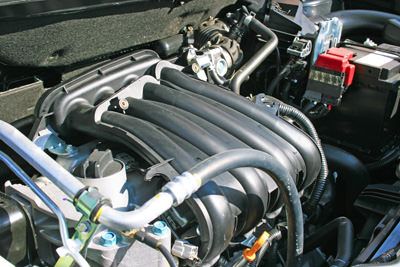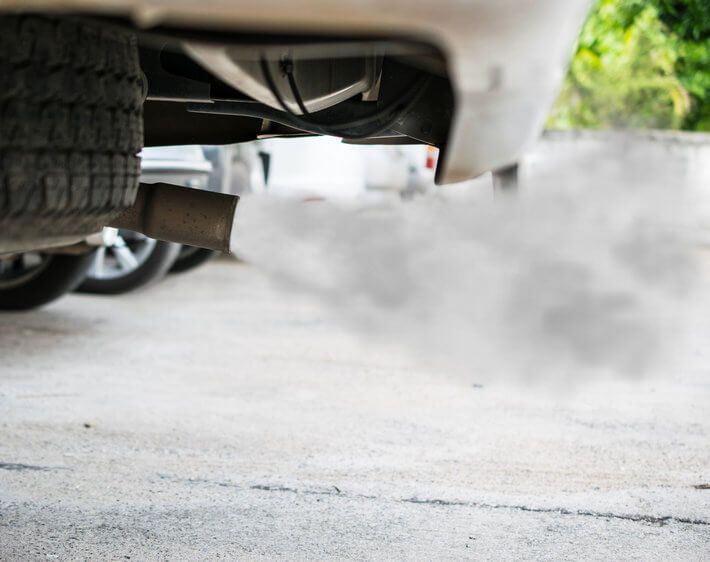What is “Black Death?"
If you’re about to go to bed and want to avoid nightmares, you might want to put off reading this until morning. If you’re about to get in the car, please read on.
While Black Death is not the same as the deadly plague during the 14th century, a car A/C system experiencing Black Death will be infected like the plague. Black Death starts out inside the compressor after refrigerant breaks down. Since refrigerant acts as a working fluid much like how motor oil is the fluid which provides lubrication to protect the engine, a refrigerant breakdown will result in ugly wear, starting in the compressor. From there, the sharp and grimy metal particles created during compressor breakdown can then travel through the rest of your A/C system, wreaking havoc on the entire system. Before you know it, all cold air, and airflow for that matter, will be long gone. Cue the A/C grim reaper.
The best protection from Black Death is an A/C Performance Check. Schedule one today.
Why does my A/C have weak airflow?
We feel your pain and discomfort caused by weak airflow. The sweat alone is enough to drive any of us crazy. However, there are a lot of factors at play. If you notice reduced airflow early on—rather than later—take the right step and have it looked at before other fatal A/C system damage can occur.
Main causes of weak airflow:
- Mold or mildew may have accumulated in the evaporator core from residual moisture that occurs during the cooling process. When this happens, air will have trouble reaching your air vents.
- A hose has come loose. This usually happens with the blower hose that supplies air to the blower unit.
- Ventilation fan is fried. If the fan’s not blowing, air won’t be flowing very well.
- Seals. No, not those seals down by the pier. Core case seals, blower house seals or evaporator core case seals; All can open up and diminish air flow. A/C ventilation systems are very sensitive and must remain sealed. Once they’re opened, the whole system is compromised.
Whatever’s the cause of your airflow problems, we have the answer. Schedule an A/C Performance Check.
Are there any system warning lights to alert me to an A/C problem?
Typically, no, but some vehicles have Driver Information Centers (DIC) that may display the status of many vehicle systems. Refer to your Owner’s Manual for more information.
My A/C isn’t as cold as it used to be, what’s going on?
There are several reasons an A/C system can lose its cool. Bring your ride to us as soon as you start noticing this symptom, it could mean the difference between needing a small repair, or worse, a large one. Here’s what can cause your cold air to lose its cool.
The lack of precious cold air could be caused by:
- A Freon leak caused by a failed o-ring, seal, hose or component
- A clogged expansion tube or refrigerant charging hose
- Failed compressor or compressor clutch
- Failed blower motor or blower motor resistor
- Damaged or failed condenser or evaporator
- Vacuum leaks
- Failed switch, fuse, relay, control module, blend door or solenoid
Leaks can be devastating. When an A/C system develops a leak, you have what’s called an “open system.” If you or your technician discovers the leak early, your repair will be less expensive. Unfortunately, if a leak has been affecting your cold air for a while, moisture will most likely have entered your A/C system and may have damaged other vital and expensive parts. Stay cool. Schedule an A/C Performance Check.
The A/C starts out cool then starts getting warm, what’s happening?
Well, like many complicated stories, there’s never one simple answer. A/C systems are a fickle breed. Your best bet is to have us inspect your system for any of the following listed symptoms.
From cold to hot and all the symptoms in between:
- The clogged expansion valve: The expansion valve distributes the proper amount of refrigerant to your evaporator. If the valve is blocked, the refrigerant can’t flow into the evaporator. With the valve clogged, the refrigerant will start to freeze the valve altogether if moisture is present.
- Faulty compressor clutch: If the clutch is not engaging with your compressor, than your compressor can’t maintain the correct pressure. Hot air will result.
- The blown fuse scenario: Fuses sometimes short out. If the fuse associated with your A/C system goes, the power to certain parts will stop.
- Leaks are an A/C system’s worst friend: Leaks are the result of damage or the presence of moisture. When moisture and refrigerant mix, nasty corrosive acids will eat away at seals and components, causing a leak.
What is the smelly, gym locker odor coming from my A/C vents?
Sounds like you have an odorific problem on your hands. There are a few issues that may be causing this smell.
Potential causes of nasty “gym locker” odors:
- Dirty and old air cabin filter.
- Moldy evaporator case. A problem for many vehicles when water sits in the evaporator case because the case’s drain is blocked. Mold will accumulate.
How do you test for an A/C system leak?
While we’re no C.S.I. unit, the ways to detect an A/C system leak are not far off from an episode of the ever popular investigation show.
Detecting leaks:
- Black light enabled dyes. You read that right. A lot of refrigerants are pre-mixed with a special U.V. dye that shows up under black light. We’ll run a black light over your A/C system to see if any dye shows up.
- Bring in the “sniffer.” A sniffer is a special device that hones in on the refrigerant’s chemical components. If there’s a leak, our sniffer will sniff it out.
What causes an A/C system leak?
Age and moisture. Plain and simple. Rubber seals and hoses can also lose their elasticity over time and breakdown allowing Freon to escape and moisture to enter your vehicle’s A/C system. Moisture is the kiss of death for your A/C system, mixing with refrigerant and creating a system destroying corrosive acid.
Quick fact: If moisture is present, it could damage your accumulator, receiver or drier. Remember, these devices are responsible for removing moisture from the A/C system and will eventually stop functioning once they are exposed to an open system (leak or crack).



